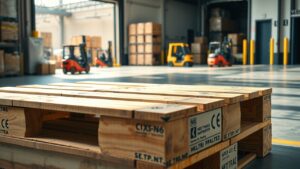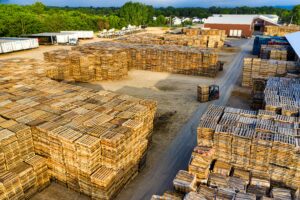Businesses across the Lower Mainland, Canada, are increasingly prioritizing sustainable practices as part of their operations. From Vancouver and Burnaby to Surrey and Richmond, companies are recognizing the environmental and economic benefits of integrating recycled pallets into their supply chains.
Recycled pallets, made from repurposed wood or plastic, provide a practical solution to reduce waste, lower costs, and improve logistical efficiency. This article explores how businesses are embracing recycled pallets, the role of pallet suppliers in supporting sustainability, and the broader impact on operations in the region.
Understanding Recycled Pallets
Recycled pallets are a cornerstone of sustainable logistics. These pallets are refurbished from previously used wood or plastic, allowing them to re-enter the supply chain without the need for new materials. Unlike single-use pallets, recycled pallets are repaired, reinforced, and treated to meet safety and durability standards.
Types of Recycled Pallets
Wooden Recycled Pallets
Wooden pallets are the most common form of recycled pallets. Damaged boards are replaced, and the pallets are reinforced to ensure they meet industry standards. They are versatile, cost-effective, and suitable for a wide range of goods.
Plastic Recycled Pallets
Made from recycled plastic, these pallets are highly durable, resistant to moisture, and ideal for industries requiring hygienic shipping solutions, such as food and pharmaceuticals.
Hybrid Pallets
Hybrid pallets combine wood and plastic components, offering both durability and flexibility. These pallets are particularly popular in complex supply chains where both strength and lightweight properties are needed.
Environmental Significance
Using recycled pallets contributes to reducing landfill waste, conserving natural resources, and lowering the carbon footprint associated with manufacturing new pallets. In the environmentally conscious market of the Lower Mainland, this aligns closely with corporate sustainability goals.
The Role of Pallet Suppliers in Sustainability
Pallet suppliers in the Lower Mainland, including Vancouver, Richmond, and Surrey, are pivotal in promoting sustainable logistics solutions. Their work goes beyond providing pallets; they ensure that businesses can integrate eco-friendly practices seamlessly.
Key Contributions of Pallet Suppliers
Sourcing and Refurbishment
Suppliers collect used pallets, repair and refurbish them, and distribute them to businesses, maintaining a sustainable cycle that reduces waste and supports the circular economy.
Customization Options
Suppliers offer custom pallet solutions to meet specific storage, shipping, and handling requirements. Customized pallets improve operational efficiency and reduce product damage.
Logistics Support
Coordinating the collection, refurbishment, and delivery of pallets requires robust logistical planning. Suppliers manage this process efficiently, ensuring minimal disruptions to business operations.
Education and Awareness
Reputable suppliers educate businesses on the environmental benefits of recycled pallets and provide guidance on selecting the most suitable pallet types for their operations.
Benefits of Recycled Pallets for Businesses
Implementing recycled pallets offers numerous advantages, from cost savings to operational improvements, while also promoting environmental responsibility.
Environmental Benefits
- Waste Reduction: Extends the lifecycle of pallets and keeps used materials out of landfills.
- Resource Conservation: Reduces the need for virgin wood or plastic, conserving forests and raw materials.
- Lower Carbon Footprint: Manufacturing and transporting recycled pallets consumes less energy, decreasing greenhouse gas emissions.
Economic Benefits
- Cost Efficiency: Recycled pallets are typically more affordable than new ones, reducing overall procurement costs.
- Durability: High-quality recycled pallets offer longevity comparable to new pallets.
- Improved Supply Chain Efficiency: Reliable pallet availability helps streamline logistics and reduce delays.
Operational Benefits
- Standardization: Many recycled pallets comply with industry size and weight standards, ensuring compatibility across shipping and storage systems.
- Custom Solutions: Tailored pallets can improve operational workflow and prevent product damage.
- Availability: A robust supplier network ensures consistent pallet supply to meet demand.
Challenges in Implementing Recycled Pallets
Despite their benefits, transitioning to recycled pallets can present certain challenges.
Quality Assurance
Ensuring recycled pallets meet safety and durability standards is essential. Businesses must work with trusted suppliers that rigorously inspect and repair pallets before resale.
Supply Chain Coordination
The collection, refurbishment, and redistribution of pallets require careful coordination to maintain efficiency and avoid disruptions.
Initial Investment
Setting up recycling programs or integrating supplier solutions may require upfront investment in planning, logistics, and training.
Perception Barriers
Some businesses initially perceive recycled pallets as lower quality than new ones. Education and demonstrations of durability are key to overcoming this barrier.
Case Studies in the Lower Mainland
Sustainable Retail Operations in Vancouver
A Vancouver-based retailer adopted recycled wood pallets for its regional distribution network. By partnering with a local pallet supplier, the company reduced shipping costs by 25% and cut its environmental footprint significantly. The move also enhanced warehouse efficiency and improved inventory management.
Food Logistics in Richmond
A food distribution company in Richmond implemented recycled plastic pallets to comply with hygiene regulations. These pallets offered moisture resistance and durability, reducing product damage and improving delivery times. Operational costs decreased by 20% after switching to recycled pallets.
Future Trends for Recycled Pallets
The market for recycled pallets is evolving rapidly, with new technologies and practices making them increasingly attractive for businesses.
Innovations and Technology
Smart Pallets: Integration with RFID and tracking systems enhances inventory management and reduces losses.
Advanced Materials: Development of eco-friendly materials ensures longevity while maintaining sustainability.
Automation: Automated refurbishment and collection systems improve efficiency and lower labor costs.
Sustainability Movement
As businesses in the Lower Mainland and across Canada prioritize environmental responsibility, recycled pallets are becoming a critical component of green supply chains. The growing awareness among consumers and regulatory incentives further drives adoption.
Trusted Pallet Solutions in the Lower Mainland
AR Pallets has been providing businesses across the Lower Mainland, including Surrey, Burnaby, and Delta, with reliable and sustainable pallet solutions. Their team ensures that each recycled pallet meets high-quality standards, allowing companies to reduce costs while supporting environmental initiatives. AR Pallets LTD, located at 12213 Industrial Rd, Surrey, BC V3V 3S1, Canada, can be reached at (604) 367-7884 or via email at info.arpallets@gmail.com, providing personalized support and guidance to optimize pallet solutions for any business need.
The adoption of recycled pallets is more than a trend it is a strategic move for businesses in the Lower Mainland, Canada, seeking sustainability, cost efficiency, and operational improvements. By partnering with reputable pallet suppliers such as AR Pallets, companies can streamline their logistics, reduce environmental impact, and embrace a more responsible approach to supply chain management. The shift toward recycled pallets reflects a broader commitment to sustainability that benefits businesses, communities, and the planet.





